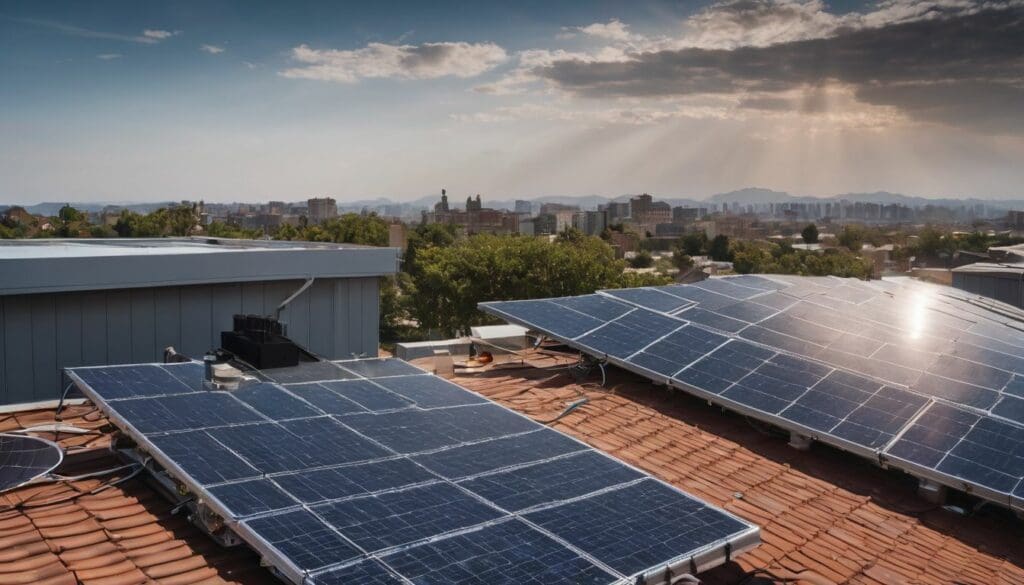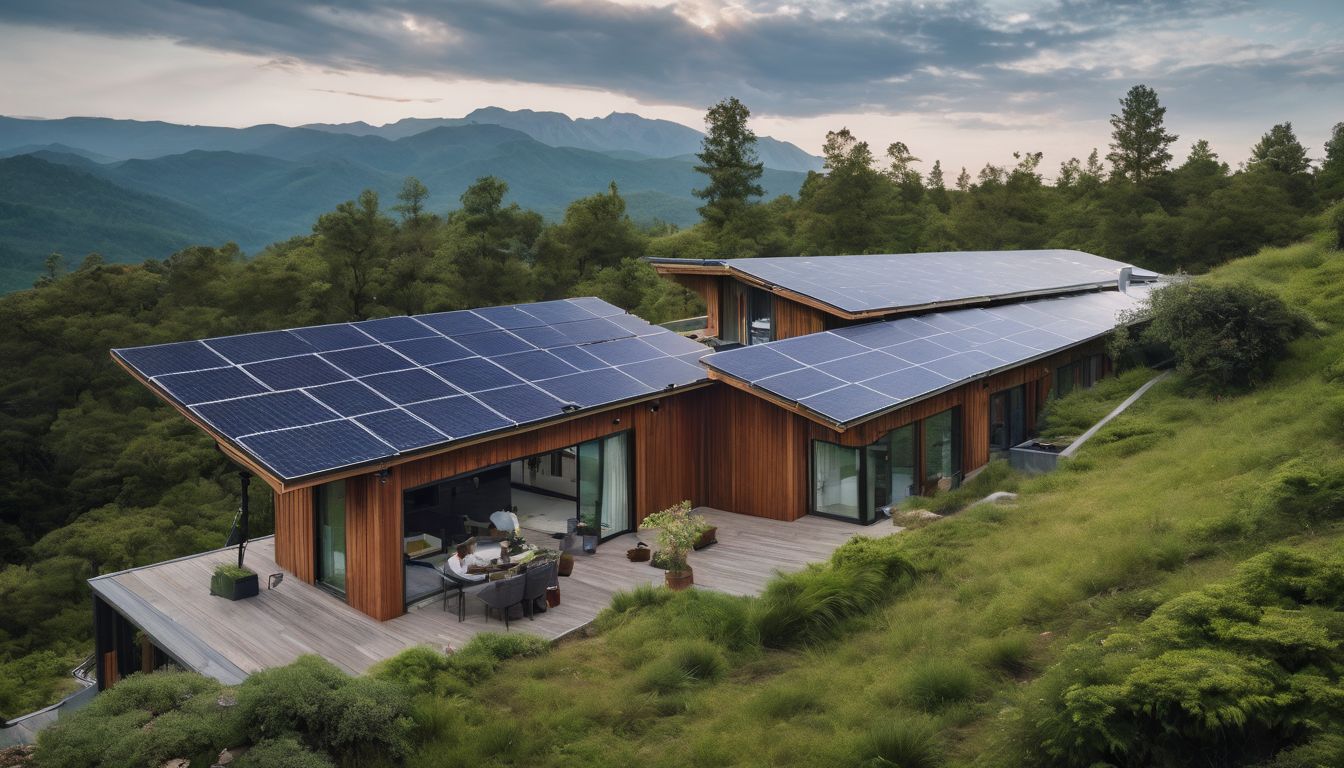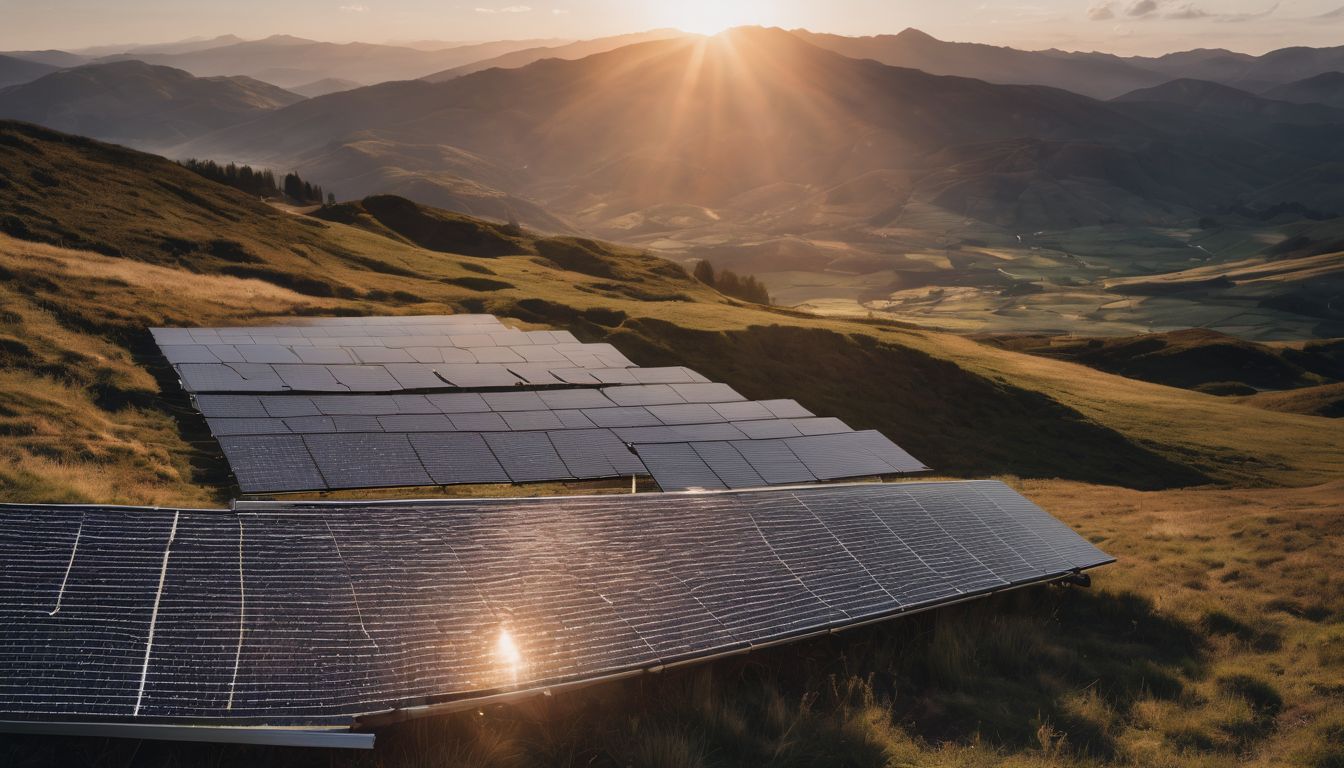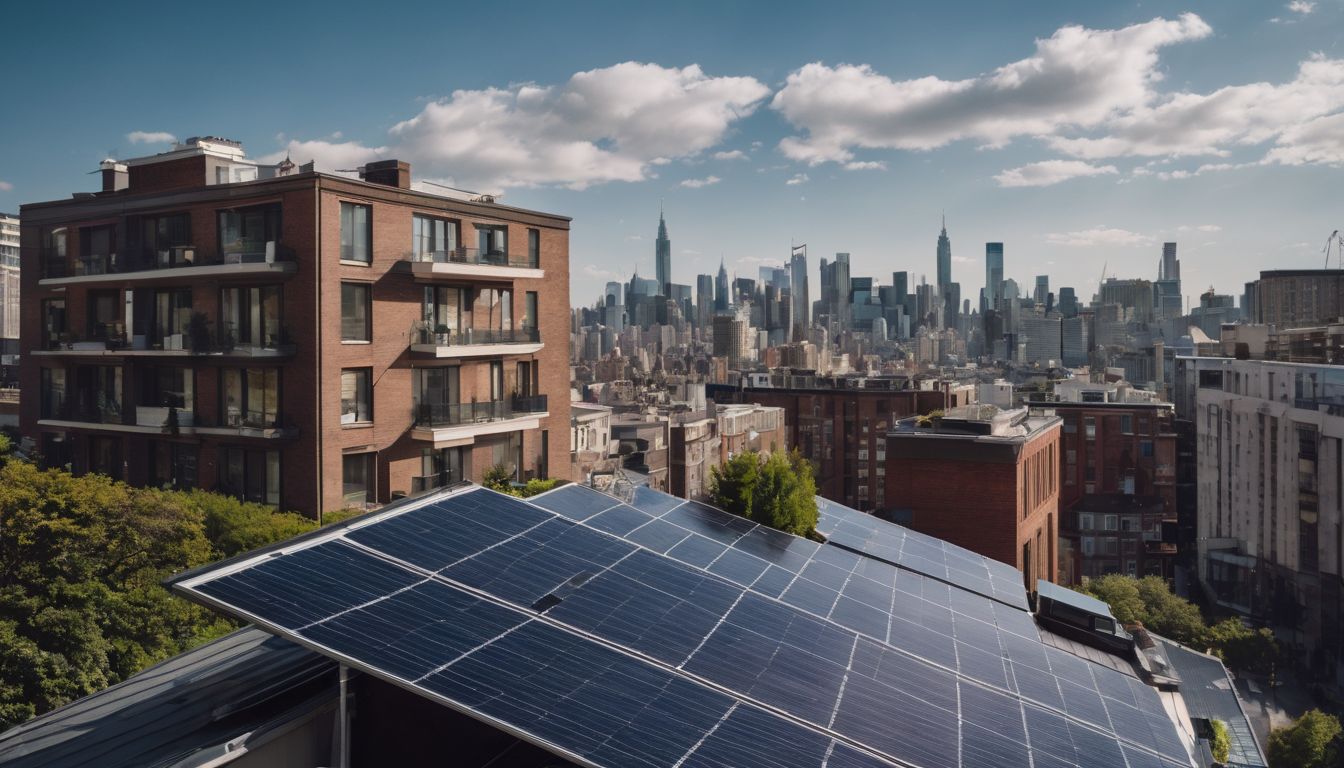Your solar panels need a clean to stay efficient, but you might be unsure how to do it safely. Surprisingly, dirty solar panels can lose more than 20% of their energy output. Our guide will give you step-by-step instructions on keeping your panels in top condition without risking damage.
Keep reading and let’s make those solar panels shine!
Key Takeaways
- Regular cleaning and maintenance of solar panels boost their efficiency and extend their lifespan, ensuring that you get the maximum return on your investment in renewable energy.
- Use soft brushes, gentle soap or specialised solutions for cleaning, avoid abrasive tools or high-pressure jets which can damage the delicate surfaces of solar panels.
- Inspections should be conducted routinely to catch any dirt accumulation, physical damage or technical issues early on for timely intervention and upkeep.
- Clean solar panels at least twice a year or more frequently if you’re in an area with heavy pollution or under trees that drop leaves and sap; also after extreme weather conditions like storms.
- If unsure about how to safely clean your solar panels or if they are damaged and require repairs, it’s safer to call in professional cleaners who have the right equipment and expertise.
Importance of Solar Panel Maintenance
Proper maintenance of solar panels is crucial for ensuring optimal performance, extending their lifespan, and maximising the return on your investment. Regular cleaning and care can significantly impact the efficiency of your solar energy system.
Ensuring optimal performance
Keeping your solar panels clean is crucial for maximum efficiency. Dirt, debris and bird droppings can significantly reduce their ability to absorb sunlight, which in turn decreases the amount of energy they produce.
Regular cleaning ensures every ray of sunshine is captured and converted into clean, renewable energy for your home.
A well-maintained solar panel system works at peak performance and suffers fewer breakdowns over time. By paying attention to solar panel care, you’re not just saving on electricity bills; you’re also investing in the longevity and reliability of your solar investment.
Routinely check for any obstructions or accumulation on the panels and clear them promptly to ensure nothing stands between the sun’s rays and your solar cells’ surface.
Extending lifespan
Regular maintenance not only ensures optimal performance but also extends the lifespan of your solar panels, maximising their return on investment. By cleaning and caring for your solar panels, you can help them operate efficiently for many years to come.
This proactive approach will safeguard your investment in renewable energy, supporting both environmental conservation and cost-efficiency.
To extend the lifespan of your solar panels, regular cleaning using appropriate techniques and materials is essential. Ensuring that dirt, debris, and other contaminants are promptly removed will help prevent any long-term damage or deterioration to the panels.
Maximising return on investment
To maximise the return on investment from your solar panels, it’s essential to ensure they are well-maintained and operating at maximum efficiency. By regularly cleaning and caring for your solar panels, you can increase their energy production, which directly impacts your cost savings and environmental benefits.
Additionally, professional cleaning services can further optimise the performance of your solar panels by using specialised tools and expertise in maintaining photovoltaic systems.
Investing in proper maintenance not only extends the lifespan of your solar panels but also enhances their overall efficiency, thereby maximising the return on your initial investment.
Steps to Clean Your Solar Panels
Once you have gathered the necessary tools and materials, turn off your solar panel system before spraying down the panels and roof. Next, apply a suitable cleaning solution and wipe down the panels before rinsing them off.
Gather tools and materials
To clean your solar panels, you will need the following tools and materials:
- Soft-bristled brush: Use a gentle brush to avoid scratching the glass surface of the panels.
- Hose or bucket of water: This will be used to rinse off any dirt or cleaning solution from the panels.
- Mild soap or specialised solar panel cleaning solution: Choose a mild, eco-friendly soap or a specialised cleaning solution designed for solar panels.
Turn off system
Before you proceed with turning off the system, make sure to gather all necessary tools and materials for cleaning your solar panels. Now, carefully follow these steps to ensure you turn off the system safely before beginning the cleaning process:
- Locate the main circuit breaker or switch that is connected to your solar panel system.
- Turn off the switch to shut down the power supply to the panels.
- Double – check that the system is completely turned off before proceeding with cleaning to avoid any accidents.
Spray down panels and roof
Apply cleaning solution
- Mix a gentle cleaning solution using mild soap or detergent with water in a bucket.
- Dip a soft sponge or cloth into the cleaning solution, ensuring it is not dripping wet.
- Gently wipe the panels in a consistent motion, starting from the top and working downward.
- Pay attention to any stubborn spots or residue, and gently scrub with a soft brush if necessary.
- Avoid using abrasive materials that could scratch or damage the surface of the panels.
Wipe down panels
To wipe down panels, prepare a soft, non-abrasive cloth or sponge and soak it in the cleaning solution. Use gentle, circular motions to wipe the surface of each panel thoroughly. Ensure complete coverage and removal of any remaining dirt or residue. Take care to avoid applying excessive pressure that could potentially damage the panels.
- Avoid using rough or abrasive materials that may scratch or mar the surface.
- Wipe in an even and consistent manner to ensure all areas are cleaned effectively.
- Pay special attention to corners and edges where dirt may accumulate.
- Rinse the cloth or sponge often to prevent spreading dirt around and ensure a thorough clean.
- Check for any stubborn stains or marks that may require a second pass with the cleaning solution.
Rinse panels
Once the cleaning solution has been wiped down, use a gentle stream of water from a hose to rinse off any remaining residue. It is important to begin rinsing from the top and work your way downwards. This ensures that all dirt and cleaning solution are thoroughly washed away. Make sure to avoid using high-pressure water as this can damage the solar panels. Allow the panels to air dry completely before reactivating your system for optimal results. Remember to repeat this process regularly for maximum efficiency.
Tips for Cleaning Solar Panels
Regularly clean your solar panels to ensure optimal performance and consider factors that may affect cleaning frequency. Find out more about the best practices for maintaining your solar panels in our full blog post.
Frequency of cleaning
Cleaning your solar panels regularly is crucial to maintaining their efficiency. Dust, dirt, and bird droppings can accumulate on the surface, reducing the amount of sunlight that reaches the cells.
Aim to clean them at least twice a year to ensure optimal performance. However, if you live in an area with heavy pollution or frequent dust storms, more regular cleaning may be necessary to maximise energy production.
Factors such as climate conditions and surrounding vegetation can also affect how often you need to clean your solar panels. Regularly inspecting and evaluating the cleanliness of your panels will help determine when they require cleaning.
Factors that may affect cleaning frequency
Several factors can influence how often you need to clean your solar panels:
- Location: If you live in an area with minimal pollution, your panels may require less frequent cleaning.
- Weather conditions: Dust and dirt accumulation can increase during dry seasons or in areas prone to sandstorms.
- Angle of installation: Panels installed at a steeper angle are less likely to accumulate debris and may require less frequent cleaning.
- Surrounding vegetation: Trees, especially those shedding leaves or sap, can increase the need for regular cleaning.
- Bird droppings and pests: The presence of birds or other animals near your panels might necessitate more regular cleaning to maintain optimal efficiency.
Safety considerations
To ensure safety when cleaning solar panels, always turn off the system before starting. Use a stable ladder and proper safety equipment like gloves and non-slip footwear. Watch out for overhead wires or obstructions when accessing your rooftop solar array.
Be mindful of hot surfaces during cleaning in bright sunlight to avoid burns.
Keep children and pets away from the area during maintenance, as they could inadvertently cause accidents or be harmed by falling debris. If using a hose, check that it’s firmly attached and does not create slippery conditions on the roof or surrounding areas.
What NOT to Do When Cleaning Solar Panels
Avoid using abrasive tools or cleaners that can scratch the panels, and refrain from using high-pressure water that may damage the panels. Regular inspections should not be neglected to ensure proper maintenance.
Abrasive tools or cleaners
Avoid using abrasive tools or cleaners when cleaning your solar panels. These harsh products can cause scratches, leading to reduced panel efficiency over time. Opt for gentle cleaning solutions and soft brushes or sponges to protect the surface of your panels while effectively removing dirt and grime.
By avoiding abrasive tools and cleaners, you can ensure that your solar panels continue to operate at their peak performance, maximising the return on your investment and supporting environmental conservation efforts.
Opt for eco-friendly cleaning solutions instead of abrasive chemicals to maintain the integrity of your solar panels. Gentle methods will help safeguard the environment by preventing harmful substances from leaching into the soil or water systems around your home.
Using high-pressure water
While it may seem effective, using high-pressure water to clean solar panels can actually damage the delicate surface. High pressure can cause micro-cracks and scratches on the panels, leading to decreased efficiency over time.
Additionally, using high-pressure water poses a safety risk as it may dislodge or loosen panel components. Instead, opt for gentle cleaning methods such as using a soft brush with mild soap and water to maintain the integrity of your solar panels while ensuring optimal performance.
Neglecting regular inspections
Regular inspections of your solar panels are crucial to ensure that they are functioning at their best. Monitoring for any signs of wear and tear can help prevent potential issues before they become major problems.
Neglecting regular inspections may lead to reduced efficiency and output, ultimately impacting the return on your solar investment.
Failing to conduct routine checks could also result in missed opportunities for maintenance, such as cleaning or repairing damaged panels. By overlooking regular inspections, you risk compromising the performance and longevity of your solar panel system.
When to Call a Professional for Solar Panel Cleaning
If extreme weather conditions have caused damage to your solar panels, or if you lack the proper equipment or experience for cleaning, it may be best to call a professional for assistance.
Professional cleaners can also help with any malfunctions or damage that may occur over time.
Extreme weather conditions
During extreme weather conditions, such as heavy storms or high winds, solar panels may become dirty or even damaged. Debris and dirt can accumulate on the panels during a storm, affecting their efficiency.
Additionally, hail or strong winds can cause physical damage to the panels. To ensure optimal performance and longevity of your solar panels, it’s crucial to inspect and clean them after extreme weather events.
Proper maintenance after extreme weather is essential for maximising the return on investment from your solar energy system. Regular inspections will help identify any issues caused by extreme conditions, allowing for timely repairs and cleaning.
Damage or malfunctions
Regular inspections are crucial to identifying any damage or malfunctions. Any cracks, chips, or other visible signs of wear should be addressed promptly to prevent further deterioration.
Physical damage may decrease the efficiency of your solar panels and can also pose safety risks, so it’s important to address any issues as soon as they are noticed.
Malfunctions in your solar panel system can lead to reduced energy production and potential safety hazards. If you notice a significant drop in energy output or irregularities in your system’s performance, it is advisable to seek professional assistance for thorough diagnostics and necessary repairs.
Lack of proper equipment or experience
Without the right tools and expertise, cleaning solar panels can be challenging. It’s crucial to have the appropriate equipment and knowledge to ensure a successful and safe panel cleaning process.
Inexperienced handling or using incorrect tools can lead to damage, reducing the efficiency and lifespan of your solar panels. Seeking professional assistance may be necessary when lacking the proper gear or experience to maintain your solar panels effectively.
Careful consideration should be given to personal safety when attempting to clean solar panels without adequate experience or equipment. Mishaps during DIY attempts can not only result in injury but also potential damage to the photovoltaic system.
Conclusion
In conclusion, regular maintenance of solar panels is essential for optimal performance and longevity. By following the recommended cleaning steps and tips, you can ensure maximum energy efficiency.
Remember to avoid abrasive tools, high-pressure water, and neglecting inspections. If faced with extreme weather conditions or equipment malfunction, it’s best to seek professional help for safe and effective maintenance.
FAQs
1. What do I need to clean my solar panels at home?
For DIY solar panel cleaning, you will likely require a soft brush or cloth, a cleaning solution designed for solar panels, and sometimes a hose.
2. How often should I clean my solar panels?
The frequency of cleaning your solar panels can depend on your environment; however, it’s common to schedule maintenance several times per year to ensure peak efficiency.
3. Can I clean my solar panels from the ground?
Yes, with the right tools such as an extendable brush or specialised cleaning kit, you can safely clean your photovoltaic panels from the ground.
4. Should I consider hiring a professional for solar panel cleaning?
If you’re not comfortable doing it yourself or if the panels are difficult to access, opting for a professional solar panel cleaning service is advisable.
5. Will regular cleaning improve my solar panel’s performance?
Absolutely! Regular maintenance and keeping your solar panels clean enhances their efficiency and contributes significantly to reliable solar energy production.





